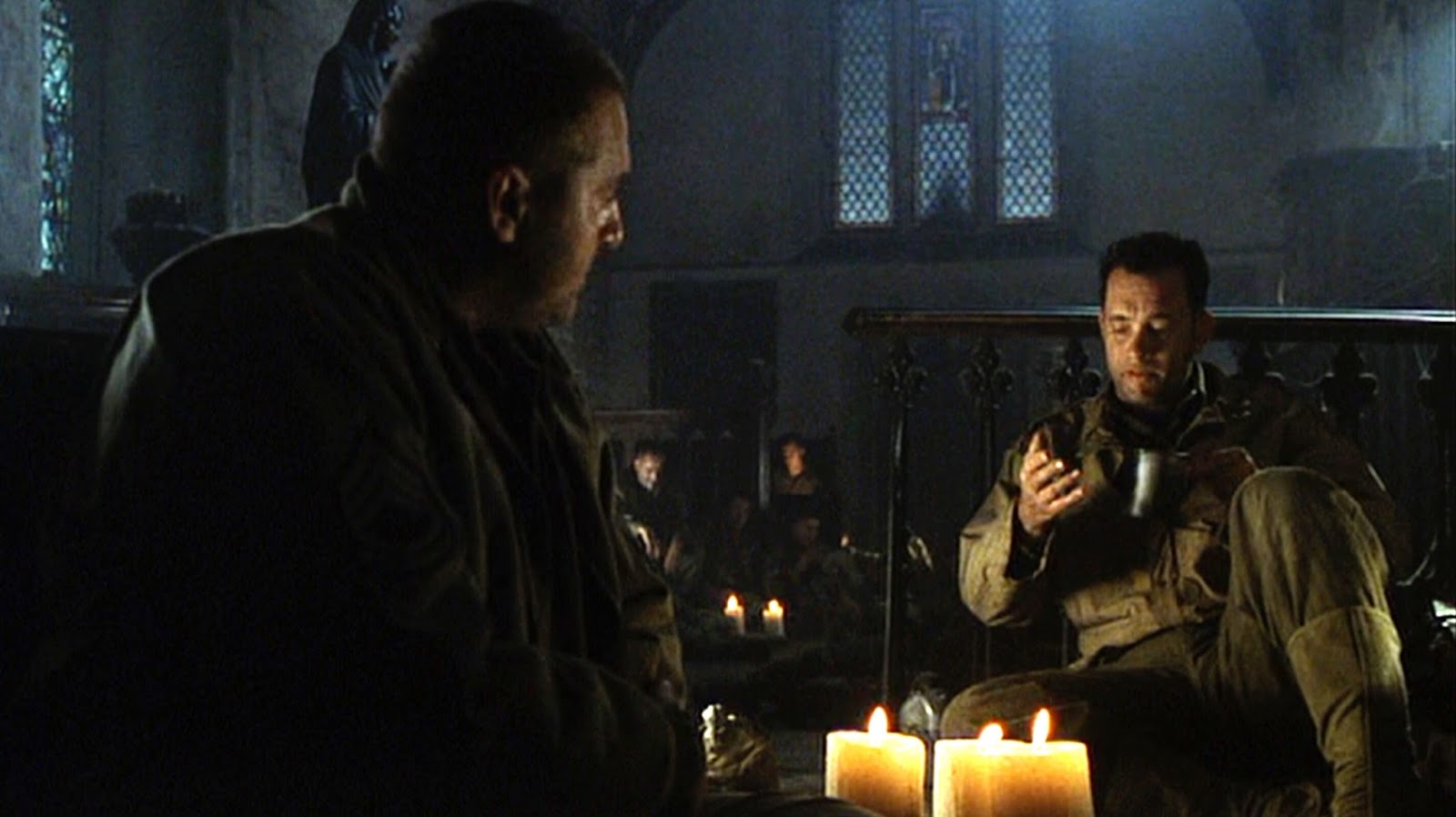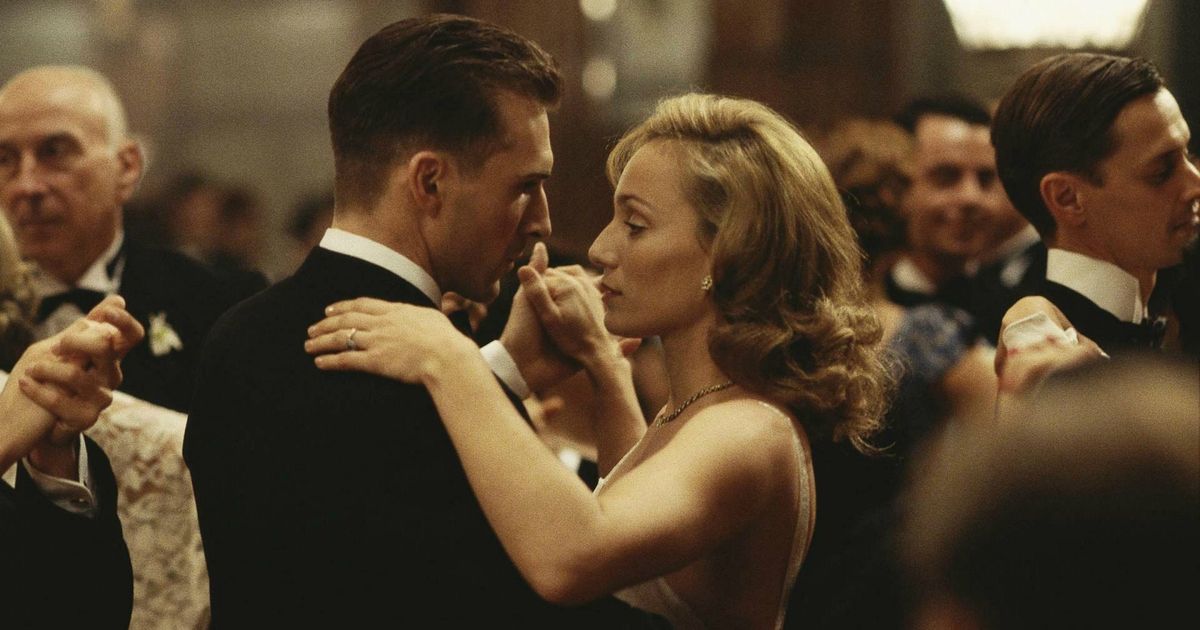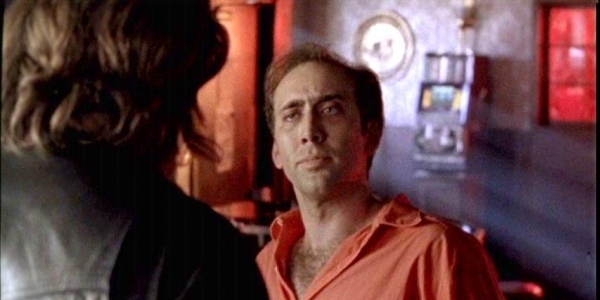World War II was never my “thing.” I certainly grew up fetishizing the military like most children of the 80’s did. I went out and played “war” with my friends, had cap guns that looked military issue and even owned an Army helmet that had once belonged to my father, despite the fact that it never once fit comfortably on my head. My very first comic book subscription, which resulted in me waiting for the mailman like a bird of prey, was Larry Hama’s seminal Marvel comic book, G.I. Joe. Along with the books I watched the cartoon religiously and saved any allowance money I earned to take to the local Ben Franklin or Ames so that I could buy the newest action figure. Most of the soldiers I played with were Vietnam veterans, not WWII, because at that point who wanted to pretend to be a character that was at best, 50-60 years old. World War II movies were ancient, old fashioned, and worst of all, in black and white. They were what my grandfather watched while he fiddled with a bandsaw in his workshop. They were full of old actors who in my mind were already long dead, and therefore, no interest to me.
Vietnam movies were what I lived for, and thankfully at that time in my life, they were plentiful. Hamburger Hill, Born on the Fourth of July, Casualties of War, Platoon, and my two favorites, Apocalypse Now and Full Metal Jacket, rotated monthly on HBO, where I could watch them under the guise of “learning about history.” Even television, which politicians swore was rotting our young brains, got into it with critical hits such as China Beach and Tour of Duty. Marvel comics even expanded its military line with The ‘Nam, which completely captivated me with its realistic and ongoing tale of life during wartime. The rebellious teenager in me loved that the Vietnam War was publically divisive, with its participants haunted by hard choices and harder lives when they returned home, which showcased so well in another favorite film of mine, First Blood.
With all of these options, World War II wasn’t interesting to me.
But if anyone could interest me in a tale of the Greatest Generation, it was Steven Spielberg, the architect of my childhood. He’d already shown his dramatic chops with his critically lauded, Oscar winning tale of the Holocaust, Schindler’s List. It was an important masterpiece, but it wasn’t about GI’s. And the less said about his early film 1941, the better. Could the man who had made films like ET, that tugged at the heartstrings, be able to marry that with the rolicking adventure of Raiders of the Lost Ark but with the realism of Schildler’s List?
That question was answered rather thoroughly within the opening thirty minutes.
As the film opens, we aren’t met with wartime, but instead an elderly man walking along the war memorial near Omaha Beach, specifically the Garden of the Missing at Colleville-sur-Mer, France. As he trudges slowly along, his family stays a respectful distance behind him. Their faces show concern, but he goes on until he arrives at a specific white cross. His face trembles, his eyes well up, and he’s no longer there. Actor Harrison Young gives a hell of a performance in that moment, and if you’re like me, you’re caught up in the why. It’s nearly impossible for me not to break down alongside him. Spielberg zooms in towards his eyes, the score slowly fades as the sound of crashing waves comes in, and suddenly we’re on Omaha Beach on that fateful day of June 6th, 1944, and any time we had for sentimentality is gone.
Tom Hanks, well regarded for often being the steadiest hand in any movie he’s in is introduced, his hand shaking as he struggles to open his canteen. His boat is headed toward the beach. As the camera pulls away from him we see his fellow soldiers trembling in their own way, eyes wide, vomiting, and clutching their gear. They all look afraid as Hanks’ Captain Miller shouts his first orders of the movie, “Move fast and clear those murder holes.” Within seconds many of them will be dead.
What ensues over the next twenty minutes are some of the most chaotic, devastating, and frightening moments I’ve ever seen on the big screen. Spielberg, cinematographer Janusz Kaminski, and editor Michael Kahn constructed an $11 million opening act that doesn’t let you catch your breath for even a moment as hell is unleashed upon your senses. There are images that are impossible to forget and even the Department of Veterans Affairs set up a 1-800 number to help any former soldiers who might have been retraumatized by what they were experiencing.
I’ve never seen war, and after this film I didn’t wish it upon anyone.
Men jumping over the edge of their transports because to stay in them meant certain death, fall into the water never to resurface as bullets tear through them. Some of those lucky enough to avoid the gunfire drown, weighted down by their gear. Those that do make it to the surface are met with constant gunfire and deafening explosions. Nowhere feels safe from death as moving even an inch can put you in the path of a bullet. But stay still and likely death will rain down from above. Men crawl forward as their limbs are torn from their bodies. In the distance a man searches the beach for his missing arm, and when he finds it picks it up and moves on.
“Where’s the rallying point?”
“Anywhere but here.”
A man flat on his back, the waves lapping at him, holds in his own intestines while screaming out for a momma that will never come to ease his pain. Medics are yelled for. Bodies are dragged out of the way, only to be hit by more gunfire and explosives. That man you were dragging is now just a heavy torso slowing you down.
The bombs continue to explode.
Soldiers move forward because its the only way. The armored bunkers of the enemy, which are your mission, seem miles away. We’re introduced to the other main players during this confusion. Medic Wade (Giovanni Ribisi) does his best to revive downed soldiers, or at best, take away their pain as they die. Around him bullets continue to hit those he works on, his efforts futile. He lashes out, screaming into the chaos to just give them a chance. Sgt Horvath (Tom Sizemore) continues to bark orders to anyone who can listen, doing his best to maintain a semblance of order. Private Reiben (Edward Burns) and the ghost like Private Jackson (Barry Pepper) back him up. Private Caparzo (Vin Diesel) has a brief moment of levity, calling one soldier a lucky bastard as a bullet ricochets off his helmet, only to have a second one hit a moment later. Private Melish (Adam Goldbert) joins them shortly.
They continue to move forward.
Little by little, inch by inch, they move up the beach until their skill, determination, and in some instances, luck help them secure the beach, winning a battle that felt endless. When the men can finally take a moment to breath, relief comes in tears, moments of reflection, or strange rituals like taking a jar full of soil and placing it in what appears to be an already well travelled bag.
Spielberg pulls the camera back a little and reminds us just how much this victory cost. As the camera moves across the red tide, bodies littered in nearly every available space, we close in on one dead soldier, only identifiable by the name on his gear. Ryan, S.
If the film had ended at this very moment I would’ve still judged it to be one of the most effective war films I’d ever seen. Instead it was only the beginning.
Prior to this film I’d never considered the room full of typists who only exist during wartime. They sit, day after day, hour after hour, writing condolence letters to those left behind, words typed out repeatedly that even in their repetitiveness cannot possibly lose their heartbreak and sorrow. How awful that job must have been, yet so important. It’s there that one member of the pool notices something, it’s never shown exactly what caught her eye, but soon enough we learn that Ryan, S, had two brothers killed in action. Their mother would be receiving those letters on the same day, all while the whereabouts of her fourth son, the titular Private Ryan, was unknown. To hammer home the importance of this moment screenwriter Robert Rodat even throughs in a quote from the most unassailable of American war stewards, President Abraham Lincoln.
The men we met during the opening scene now have a new mission, to find a needle in a stack of needles and bring him home. For the next two hours we will spend time alongside those soldiers as they endure the pain of war, questioning their orders, their role in the war, but never losing sight of the fact that the men that surround them will fight to the death to protect them, a band of brothers. We won’t get to know all of them well, as many will fall during the journey, but each gets a moment and gives the viewer a reason to care about them and to mourn their loss. Adam Goldberg, Giovanni Ribisi, Tom Sizemore, and Jeremy Davies, as the naive soldier Corporal Upham give the performance of their careers. But despite their attempts, they are still outshone by one man.
He might’ve already won two Oscars by this point in his career, but for my money this is the best performance of Tom Hanks’ career. He doesn’t get the opportunity to have a showy role like he did in Philadelphia, or even become a cultural icon like he did as Forrest Gump , but what he shows us in Saving Private Ryan is the best of humanity. Captain Miller doesn’t get to give a rousing Patton-esque speech or storm into battle like Braveheart, but from the second we meet him and his platoon we know his men love him and will follow him, even when the orders are FUBAR. They trust him. Miller cares for his men and speaks plainly to them, getting them to believe him. He doesn’t argue or gripe with them, because as he puts it, gripes always go up the chain of command. He’s a good soldier, but he’s just a man, an English composition teacher from Pennsylvania who doesn’t seek glory or fame. He just wants to do what is necessary so that he can go home. He’s human. He gets scared and frustrated when people don’t listen to him and end up dead. He knows his choices are difficult and not always right and sometimes the blame of death lays at his feet. He’s sorry when he’s in the wrong and doesn’t gloat when he’s right. He’s smart, capable, and brave in the face of the worst the world has to offer. He loves his wife. “With every man I kill the further away from home I feel.” He’s reflective enough to wonder if his wife will even recognize the man he’s become. He was comfort in uncomfortable times.
He’s human, and at its heart, Saving Private Ryan is a story about humanity during wartime.
As I sat in that full theater on opening night, surrounded by humanity, I forgot about them while the film unfolded. I became so entranced in the film that I forgot I was sharing the experience with two hundred other people. But when the credits rolled, no one rose from their seat. Before Marvel and their post credit scenes most people didn’t stick around to see who the gaffer or the caterer were. But as that list of names moved across the screen I could hear people for the first time in nearly three hours. All I could hear was sobbing, and as the lights went up I could see that others had the same reactions that I did. Eyes weren’t dry, faces were red, and honestly most everyone appeared shell shocked by what they had just experienced. People were looking around for someone to hug and comfort.
It was humanity at its best.
That had never happened to me in a theater.
I’m not sure if it has since.


